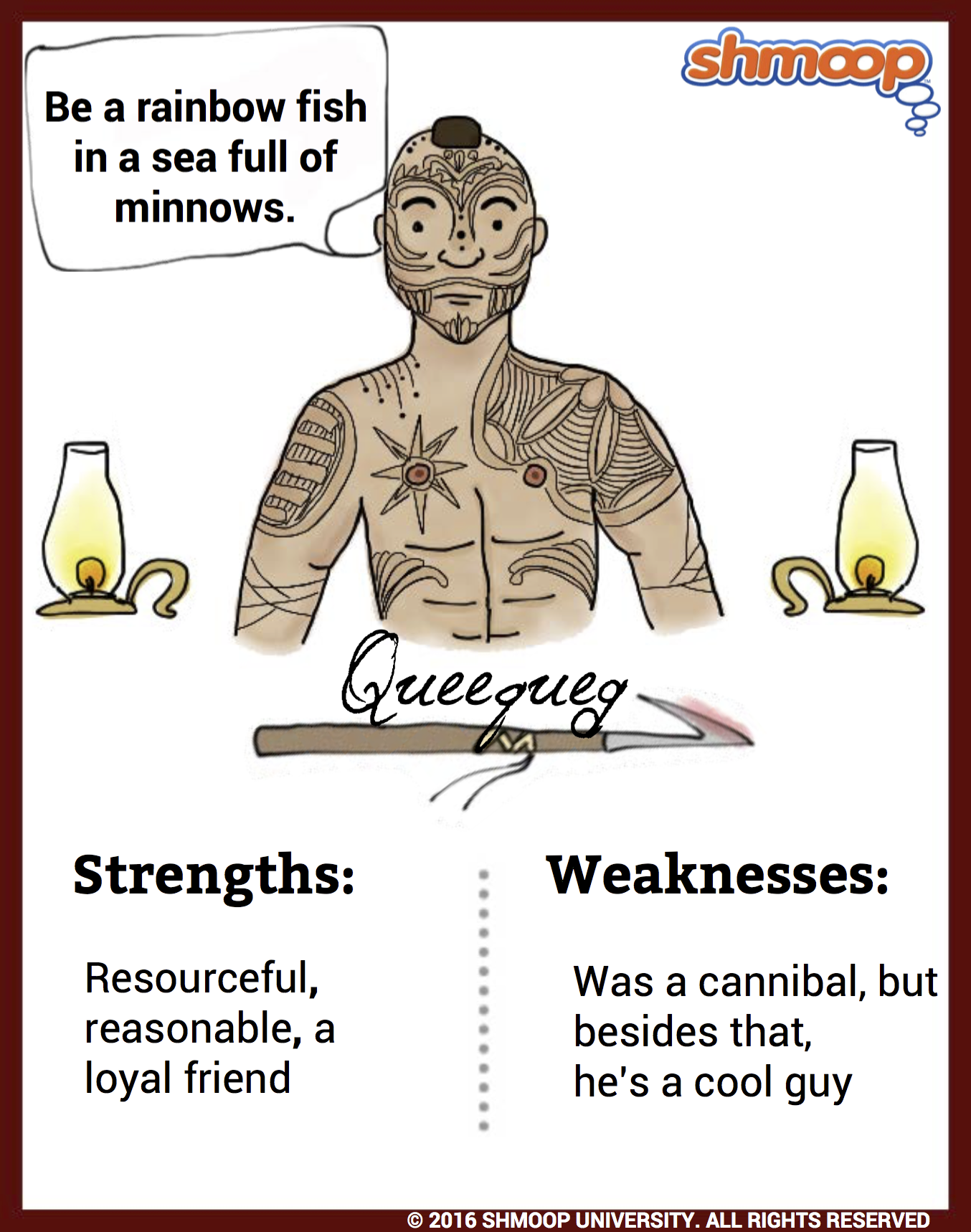Character Analysis

(Click the character infographic to download.)
King Queequeg
Ugh, it would have looked so much cooler if we could have written "Queen Queequeg."
Queequeg, like his best buddy Ishmael, has a bit of the ol' wanderlust in him. The son of a king on a (fictional) South Sea island, Queequeg is desperate to find out what it was like to sail on one of the white men’s whaling ships. In fact he’s so desperate that, when a passing ship turns down his application, he throws himself onto the deck, grabs hold of something, and won’t let go... even when they threaten to cut his arm off.
And that is the inauspicious beginning of his career as a harpooneer.
Ever since then, Queequeg’s been sailing around on different whaling ships, living among strangers who think everything about him—his skin color, his religion, his tattoos, and his language—is weird. But Queequeg doesn’t seem to get too lonely; he’s a resourceful and self-sufficient guy, and a very good harpooneer.
Queequeg doesn’t even seem to mind that he’s covered in strange tattoos that, we discover toward the end of the novel, even he can’t decipher. They were drawn by a wise man, who wrote a whole treatise about astrology on Queequeg’s skin and then died without explaining it, leaving nobody able to understand his magnum opus. But this doesn’t seem to bother Queequeg much, although sometimes he seems to be studying himself, trying to crack the code.
Queequeg also has a general sense that someday, at the right time, he’ll go back to his island and be king over his people—just not yet. Unfortunately, Melville has other ideas. Queequeg becomes first mate Starbuck’s harpooneer on board the ill-fated Pequod, and the rest is history.
Everything I Need To Know About Life I Learned From A Cannibal
We first meet Queequeg along with Ishmael, when the two of them are introduced at the Spouter-Inn because they have to share a bed. At first, Ishmael is frightened of Queequeg—his dark skin and all-over body tattoos, the (eek) shrunken head he’s flashing around town, and the wooden idol he worships all make Queequeg seem just too different.
After spending a night sharing his bed, however, Ishmael warms up to Queequeg, and so do we. Even though Melville makes fun of Queequeg’s customs to an extent—the holiday on which he fasts seems ridiculous, his English is bad, and he doesn’t know which clothes to put on first—Melville also makes Queequeg seem more reasonable than most of the other characters in the novel. Queequeg has skills, he’s mellow, he doesn’t let himself get worked up over things he can’t change, and once he finds a friend, he swears fidelity to that friend for the rest of his life:
If there yet lurked any ice of indifference towards me in the Pagan’s breast, this pleasant, genial smoke we had, soon thawed it out, and left us cronies. He seemed to take to me quite as naturally and unbiddenly as I to him; and when our smoke was over, he pressed his forehead against mine, clasped me round the waist, and said that henceforth we were married; meaning, in his country’s phrase, that we were bosom friends; he would gladly die for me, if need should be. (10.7)
Queequeg also splits all his worldly possessions, in the form of a little money, with his broke friend Ishmael. (To all our friends: guys, why haven’t you followed Queequeg’s sterling example?) Queequeg is calm, honest, generous, faithful, and hard-working. In fact, Queequeg is probably the best character in the novel, not in the sense of being the coolest (though he is awesome), but in the sense of being the best human being. He doesn’t have Ishmael’s neuroses, Ahab’s obsessiveness, or Starbuck’s lack of moral courage. He’s just an all around good guy, a real mensch. And Melville wants us to realize this.
Melville wants us to know that the tattooed, dark-skinned guy who’s actually feasted on roasted missionary in the past is just as likely to be a good person as a self-righteous, white-skinned Nantucket Quaker. Okay, maybe the cannibalism thing is a little extreme, but you get the idea. Queequeg’s character gives Melville the chance to challenge the reader’s preconceptions about race and appearance—even if Melville does take advantage of the opportunity to make some racist jokes about pidgin English, too.
Tupai Cupa, The "Real" Queequeg
Scholar Geoffrey Sanborn recently discovered that Melville based the character of Queequeg on an anecdote about a Maori chief named Tupai Cupa, which Melville read in a book called The New Zealanders by George Lillie Craik (published in 1830). Tupai Cupa also stowed away on a ship and refused to be thrown off because he wanted to see Europe. (You can read more about Tupai Cupa in Sanborn’s article "Whence Come You, Queequeg?" in a 2005 issue of the journal American Literature).
Queequeg's Timeline